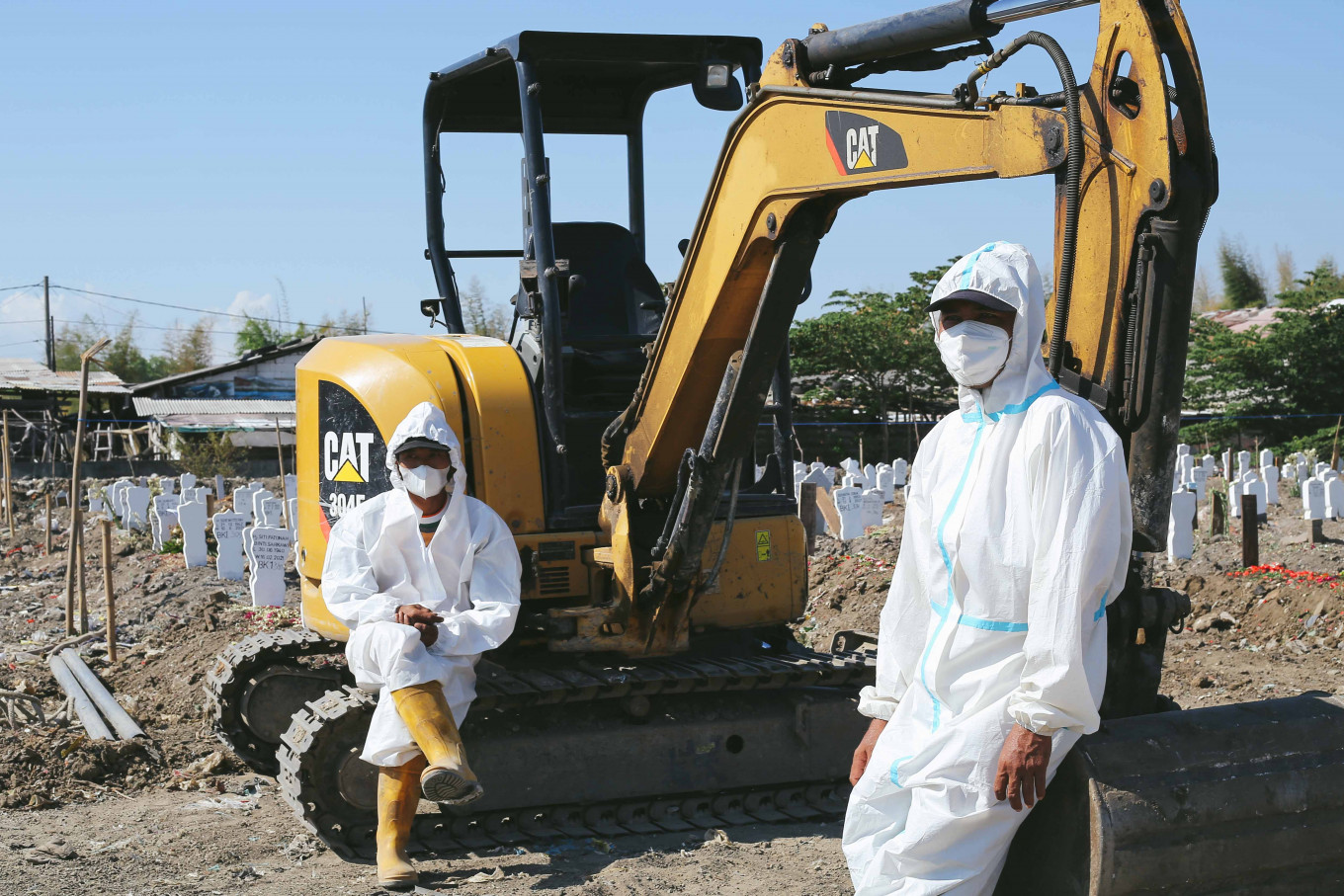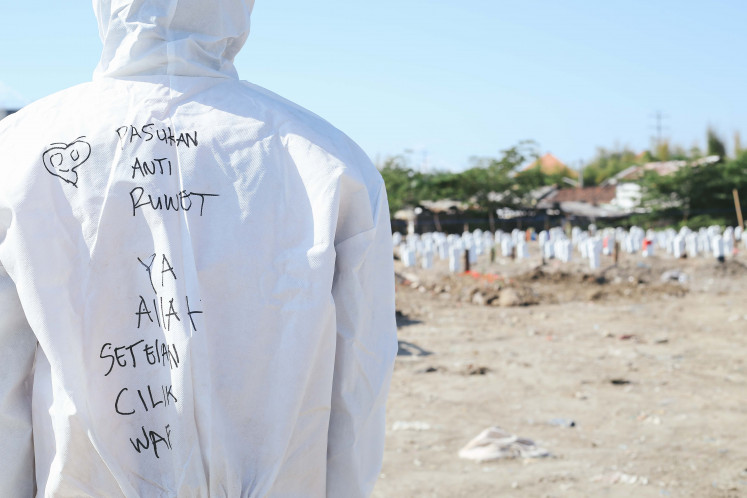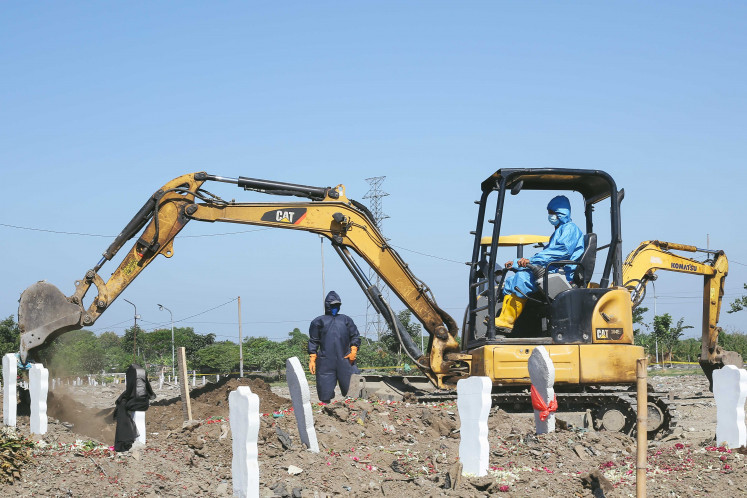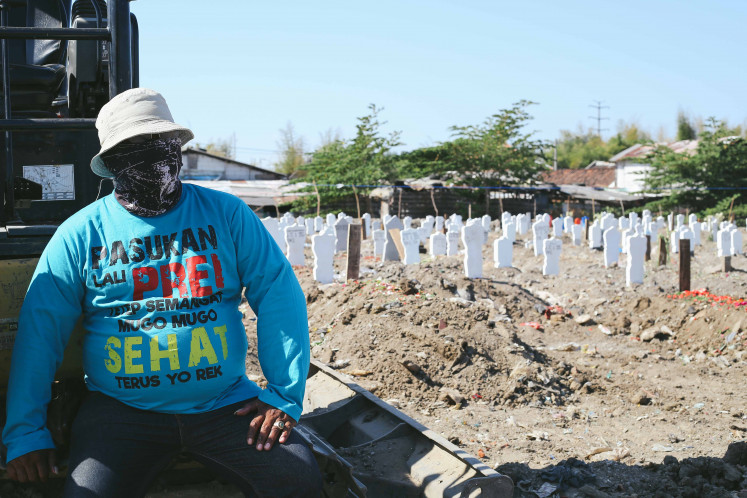Popular Reads
Top Results
Can't find what you're looking for?
View all search resultsPopular Reads
Top Results
Can't find what you're looking for?
View all search results'I want to see this all end soon': Gravediggers' endless mental, physical challenges amid COVID-19
Twelve-hour shifts and facing the constant wrath of grieving family members, working as a COVID-19 gravedigger can take an unfathomable mental and physical toll.
Change text size
Gift Premium Articles
to Anyone
"This is like a nightmare for me. I've worked for 25 years as a gravedigger, and I've never been afraid of death. But this year, that [fear] started to exist. Because death [has] come without a break — as if it won't leave us alone," said Munaji, a burial coordinator who works at the Keputih Cemetery in Surabaya, East Java.
When The Jakarta Post spent 10 hours with him and his colleagues on Monday, Munaji was barely able to finish a cup of coffee without his cellphone ringing to interrupt his attempt for a break. On the other end of the phone, someone would report that yet another body would soon arrive.
"Look at that. I have another one coming for us again," said the 51-year-old, who is better known as mbah Ji, a term referring to his seniority in experience and age.
He immediately slipped into his hazmat suit and rode his old motorbike to a new cemetery block that had just been opened at the beginning of last month.
It was 12 p.m. The 35 degrees Celsius weather seemed to burn everything under the incandescent rays of the sun. However, mbah Ji continued to his work without complaint. He jumped on an excavator upon arriving at the burial area and began dredging the ground for the bodies that would arrive.
"This is the eighth body today," he said in between his work. "During the peak, we had 80 bodies to bury before noon!"
According to mbah Ji, the middle of June to the end of July was the peak of the epidemic. One day during that period, he found himself overwhelmed by having to bury 120 people who had died within a span of 24 hours.
Some gravediggers no longer go home at the end of their shifts for fear of infecting their families. (JP/Ivan Darski)Mbah Ji said that he was not aware of rumors about discrepancies found in the government official tally of COVID-19 deaths. For example, the East Java COVID-19 task force reported zero deaths on July 18. But in an interview with the Post for this story, Aswin Agung, the head of the Surabaya Cemetery and Burial Ground Technical Implementation Unit (UPTD Pemakaman DKTRH), claimed 3,500 bodies had been buried with COVID-19 protocols that month.
"I don't know how many [deaths] were reported [to the provincial government]. As far as I'm concerned, our job is to take care of the buries as well as possible and report the data to the public relations department of the city of Surabaya. The rest is out of our [responsibility]. I concentrate on encouraging and providing everything needed for my fellow gravediggers who are on duty," Aswin said.
Death never stops
Heru Siswanto, 36, is another gravedigger at the Keputih Cemetery. During his 15 years on the job, he said he had never buried more than 10 bodies in a single day. He expressed his anger toward those who do not believe that COVID-19 is real.
"I want them to come here and count how many deaths have happened until now. People like that won't believe [in COVID-19] until someone in their own family falls victim [to the disease]. Well, I'm not praying [for a death], but I count myself as an eyewitness that COVID-19 is real. The first time [I started to become aware of the pandemic], I was taken aback. How could so many people die all at once?"
Heru no longer goes home at the end of his shift because he is worried about infecting his wife and children with the virus. Furthermore, he no longer has the energy to travel to and from work — even though his home is only 10 kilometers away. Since the pandemic hit Indonesia last March, Heru and his colleagues have been working 12-hour shifts every day.
"When I see several people die from one family, I'm utterly horrified. I think to myself, What if that happened to my family? I remember a time when an entire family had to be buried within a week; first, the husband, then the child and finally, the wife followed after. Wow, that messed up my mind. Fortunately, here, my friends and superiors are very supportive. They tell you that it's okay not to go home, as long as we and our own families are safe," he explained.
Mbah Ji concurs. He has two grandchildren who are toddlers from his eldest daughter. More than a handful of times when he has to bury the corpse of a child, his thoughts have drifted to his own family.
"I was shaking and I was thinking about my grandchildren. And I can imagine how broken up the parents must be, especially if it's their first child, still small and cute. My heart is broken," mbah Ji added.
For the past year and a half, mbah Ji has been forbidden from turning off his cellphone. Even when he sleeps, he always keeps the phone close to his ear because as a field coordinator, he must be ready to receive calls for help at any time. He joked that he had once been kicked out of the house by his wife, who was annoyed because mbah Ji never calmed down, even before going to bed.
"This is a ridiculous story. When I was about to hug my wife, suddenly my cellphone rang and I was asked to return to the [burial] ground. It was midnight. My wife was stumped and said, 'Sure! I don't mind! Just sleep in one of the graves!' All because I failed to give her a proper hug," he said, laughing.
No more room: Gravediggers are forced to use excavators to dig graves and make space for the increasing number of bodies. (JP/Ivan Darski)Though mbah Ji understood his wife's anger, he had no other choice.
"Working to help the dead rest easy is a humanitarian call for me. My pleasure can wait. The important thing is to help ease the burden of those who are grieving."
Total exhaustion: 'Tired body, tired mind'
There are two prerequisites for becoming a gravedigger. The first is the physical endurance to bury hundreds of bodies per day. And the second is mental resilience to face the grief and even anger of family members. For mbah Ji and Heru, the first can be handled with healthy food and a never-ending stock of vitamins. But nothing had prepared them for the latter.
Gravediggers are often the target family members' tantrums, especially those who cannot accept that their loved ones are being buried under COVID-19 protocols. Cemetery workers have had to argue with families who tried to forcefully bring the body of COVID-19 victims home. If these attempts succeed, the gravediggers face the threat of losing their job.
"I've been chased by family members, even though I've begged and explained that we're just doing our job. But they don't want to hear that — they assume that this is a conspiracy and so on. We don't know anything. Our job is to bury the bodies according to the recommendations and rules that the government has set," explained mbah Ji.
According to mbah Ji and Heru, families who are desperate because they fail to negotiate with hospitals to bring the body of a loved one home will try their luck once again at funeral parlors. Those working at cemeteries also have to beg for mercy from the family to carry out their tasks. According to the gravediggers, there have been cases of families threatening funeral officials with a lawsuit.
"We beg the families, but we also understand that they are grieving and their emotions are unstable. However, the risk is to sacrifice our own mentality. Tired body, tired mind," said mbah Ji.
No days off: Munaji, or "mbah" Ji, is the head of the Keputih Cemetery grave-digging team. (JP/Ivan Darski)The gravedigger trembles every time he receives a call because the pressure of the burials was getting heavier. He worries that one day, he would give in to his own emotions and express his frustration in negative ways.
"Come on, things like that [conspiracy accusations] add to our burden. Please, we know nothing of politics. Please don't add to our burden by accusing us of this and that. We are too tired after working 24 hours."
Mbah Ji has been working for about three months without a day off. He has to sleep at the cemetery because bodies could arrive at any time. He hopes that he will no longer have to spend Idul Fitri at the cemetery.
"What I want is to see all of this — this madness, these terrible times — come to an end."














